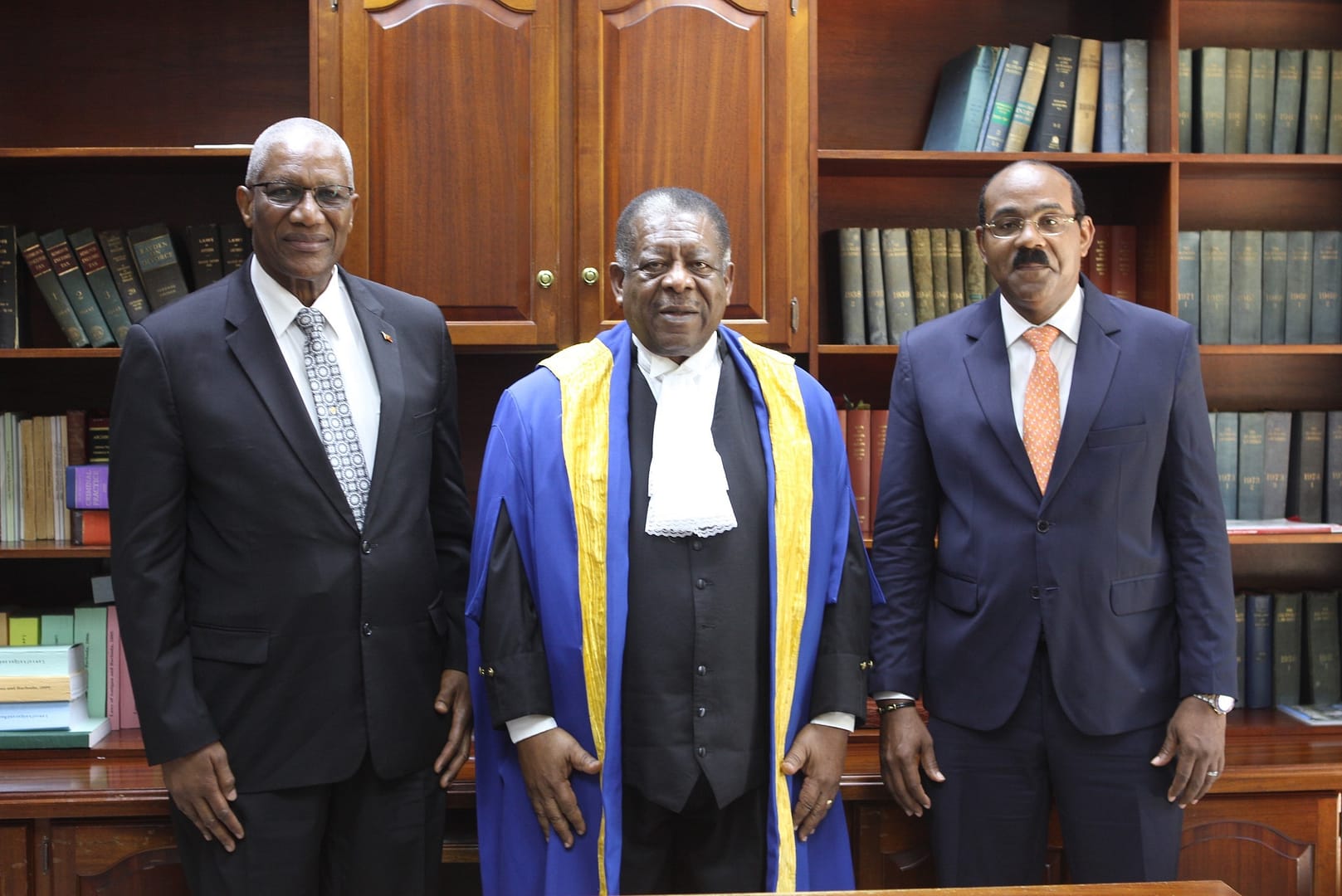
Prime Minister Gaston Browne has reiterated the need for a non-partisan approach to the November 6 referendum when citizens will vote on whether or not to replace the London-based Privy Council with the Caribbean Court of Justice (CCJ) as the island’s final court.
Speaking at the launch of the national consultation on the Privy Council and the Trinidad-based CCJ, Browne recalled that when the first attempt had been made to put the matter to a referendum last year, his government had solicited the support of then CCJ President Sir Dennis Byron to get the two main political parties to sign an agreement ensuring a bi-partisan approach to the issue.

“We are not seeking to go this alone. This is a not a Labour Party issue. What we are seeking to do here is to have mature discussions about the issues with the understanding that we will come to some common ground on the way forward,” Browne told the audience that also included the recently appointed CCJ President, Justice Adrian Saunders.
Browne said that he believes there’s some level of common ground already existing here regarding the transition from the Privy Council to the CCJ notwithstanding issues still be agreed upon.
“We have all decided that that transition has to be made. Clearly there are fears,” he said, adding that following the signing of the agreement with the leadership of the main opposition United Progressive Party (UPP) “additional demands were made.
“The demands included additional issues to be part of the referendum. And when we look at the history in the other countries, primarily Grenada, St. Vincent and the Grenadines, we recognise that would be fraught with danger.
“Let us face it, it is very difficult for a government to win a referendum on a simple majority, much less a majority of 67 per cent and it cannot be achieved by any single party. If the UPP was in government today they would not be able to achieve it on their own and we know that we cannot achieve it on our own,” Browne said.
He told the audience that’s why his administration is seeking to galvanise the entire country “so that we can come to some common ground and to make that transition as soon as possible.
“In fact it is overdue. We are 37 years old. We are an adult nation and we are in a position now, with the support of the CCJ to preside over our own jurisprudence,” he said, adding that the discussions with the UPP had disintegration to the extent that the agreement signed earlier had to be scuttled.
Browne said he was informed that as late as a week ago, the UPP had been advising its supporters against supporting the CCJ in the referendum.
“However, we are heartened that since the intervention of the President of the CCJ that the UPP has now taken a position that they could come on board with certain undertakings”.
Browne told the audience that also included the UPP leader, Harold Lovell, that one of the undertakings “is that the government will proceed with comprehensive constitutional reform.
“I want to give you a commitment today…all the members of the UPP and all the people of Antigua and Barbuda that we will pursue comprehensive constitutional reform. We will, to the extent that my government has passed the decision to engage the UPP party to appoint the deputy chairman of the Constitutional Commission,” he said, noting that Sir Dennis had agreed to serve as the chairman.
He said he expects the additional members will come from the wider civil society adding ‘so we are not trying to politicise this issue.
“But you have to take into consideration that as politicians we are also stakeholders and at the end of the day we are entrusted with the leadership of the country,” he said, noting that the Parliament has already given approval to the CCJ legislation and that the referendum would complete the circle leading to the acceptance of the CCJ as the island’s final court.
“It means now that two thirds of the people will now have to go to the referendum and vote in favour of the CCJ for us to achieve that transition,” he said.
The CCJ was established in 2001 by regional governments. It has two jurisdictions –Original and Appellate – and while most of the Caribbean countries are signatories to the Original jurisdiction, only Barbados, Belize, Dominica and Guyana have signed on to the Appellate Jurisdiction of the CCJ that also functions as an international tribunal interpreting the Revised Treaty of Chaguaramas that governs the regional integration movement.
Earlier, during the deliberations, officials of the Privy Council, addressed the audience by Skype and the Chair of the National Coordinating Committee, Dr. Clarence Henry, said the intention was to be transparent, and presenting facts concerning both apex courts.
“So, what is before us today my dear people, voters of this fair land of Antigua and Barbuda, are the CCJ and the JCPC – in their respective roles as courts of final appeal. In the case of the JCPC, we have had a much longer and enduring history. In fact, for all of our lives, first as a colony, and then as an independent nation.
“There is no denying that it has helped develop a foundation for the functioning of a system of law and judicial independence.
“The question now focuses on completing the construction project as we mark 37 years of political independence and, as our national anthem dictates, we commit ourselves to building a true nation brave and free,” Henry added.
Advertise with the mоѕt vіѕіtеd nеwѕ ѕіtе іn Antigua!
We offer fully customizable and flexible digital marketing packages.
Contact us at [email protected]


















Did he not listen to the interview with Harold Lovell on Observer AM this morning (Friday 21st September) where he stated the party’s position is one of “ebb and flow” and that he will NOT instruct his supporters how to vote. Rather they should vote with their conscience. I agree with him. “Let your conscience be your guide.”
Haven’t they seen the light and called this off yet? What a propaganda fiasco. Waste of space these people.
Who will they bring in next? Marcus Garvey?? Vote NO to the CCJ!! Too much political influence and Freemason influence. C’mon my people let’s show them what democracy is all about. Vote NO to the CCJ on November 6.
Comments are closed.